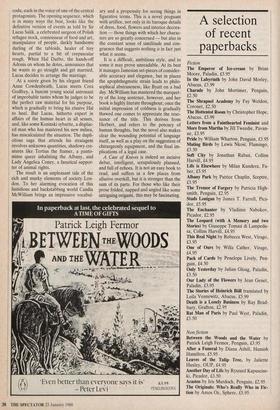A first stab at the rich
David Profumo
A CASE OF KNIVES by Candia McWilliam
Bloomsbury, £12.95
Ford Madox Ford once described in It Was the Nightingale how he could not begin a scene in a novel before he was satisfied about every detail concerning 'the aspects of kitchens, the material of which dresses are made, the leather used in shoes, the method used in manuring fields, the nature of bus tickets.' In the event, he often left much of this out; Candia McWil- liam has chosen to make such abundant detail both the theme and the decoration of her distinctive first novel.
This bleak story of parallel lives and crucial misunderstandings is rendered in three consecutive sections plus a short
coda, each in the voice of one of the central protagonists. The opening sequence, which is in many ways the best, looks like the definitive version of events as told by Sir Lucas Salik, a celebrated surgeon of Polish refugee stock, connoisseur of food and art, manipulator of people, darkly handsome darling of the tabloids, healer of tiny hearts, partial to a bit of crepuscular rough. When Hal Darbo, the hands-off Adonis on whom he dotes, announces that he wants to go straight and get married, Lucas decides to arrange the marriage.
At a soirée given by his elegant friend Anne Cowdenbeath, Lucas meets Cora Godfrey, a buxom young social astronaut of improbable tastes whom he judges to be the perfect raw material for his purpose, which is gradually to bring his elusive Hal to heel. But Lucas, hitherto expert in affairs of the human heart in all senses, and, like some Kozinski sybarite, a displac- ed man who has mastered his new milieu, has miscalculated the situation. The dupli- citous saga that attends his stratagem involves unknown quantities, shadowy cre- atures like Tertius the framer, a panto- mime queer inhabiting the Albany, and Lady Angelica Coney, a fanatical suppor- ter of animal rights.
The result is an unpleasant tale of the rich and murky elements of society Lon- don. To her alarming evocation of this fastidious and backstabbing world Candia McWilliam brings an impressive vocabul- ary and a propensity for seeing things in figurative terms. This is a novel pregnant with artifice, not only in its baroque details of dress, food, flowers and interior decora- tion — those things with which her charac- ters are so greatly concerned — but also in the constant sense of similitude and con- gruence that suggests nothing is in fact just what it seems.
It is a difficult, ambitious style, and to some it may prove unreadable. At its best it manages Jamesian set-pieces of consider- able accuracy and elegance, but in places the apophthegmatic strain leads to philo- sophical abstruseness, like Byatt on a bad day. McWilliam has mastered the marquet- ry of the long sentence, however, and her book is highly literate throughout; once the initial impression of coldness is gradually thawed one comes to appreciate the reso- nance of the title. This derives from Herbert, and refers to the potency of human thoughts, but the novel also makes clear the wounding potential of language itself, as well as a play on the suggestion of chirurgeonly equipment, and the final im- plications of a legal case.
A Case of Knives is indeed an incisive debut, intelligent, scrupulously planned, and full of echoes. It is not an easy book to read, and suffers in a few places from allusive overkill, but it is stronger than the sum of its parts. For those who like their prose folded, napped and angled like some intriguing origami, this may be fascinating.



























































 Previous page
Previous page